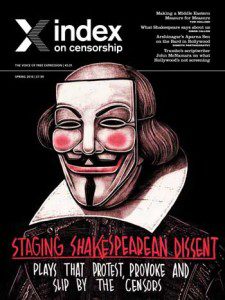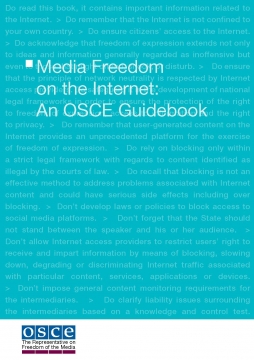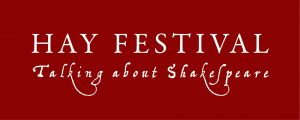22 Apr 2016 | Magazine, Volume 45.01 Spring 2016 Extras

Order your copy of the spring issue of Index on Censorship here.
Saturday 23 April marks the 400th anniversary of Shakespeare’s death. The Bard’s work has long been used to tackle difficult or controversial issues; issues that most often only received an audience due to the cloak of his respectability. To honour the occasion Index has put together a list of all things Shakespeare.
Shakespeare and his role in protest and dissent is the theme of the spring 2016 issue of Index on Censorship magazine: Staging Shakespearean Dissent; Plays That Protest, Provoke and Slip by the Censors. The issue features pieces that explore how the bard’s plays have been used to circumvent censorship and tackle difficult issues around the world; from Bollywood adaptions to Othello in apartheid-era South Africa and a ground-breaking recent performance of Romeo and Juliet between Kosovan and Serbian theatres, along with reports on theatre upsetting people in the USA, and interviews with directors around the world
Index on Censorship magazine editor Rachael Jolley introduces our Shakespeare special issue with her editorial piece, How Shakespeare’s plays smuggle protest. In this piece Jolley discusses how the work of “established” or “historic” playwrights gave actors the chance to tackle themes that would otherwise never be allowed.
Shakespeare was no stranger to censorship, from the Elizabethan to Jacobean police states. In this extract actor and theatre director Simon Callow looks at how his plays amused monarchs and dictators but also prompted their anger.
My Mate Shakespeare recasts the playwright as a brandy loving bingo addict, struggling in a war zone. The poem, which was published in the spring issue of Index on Censorship magazine, was written by poet Edin Suljic following a visit to his home country, Former Yugoslavia. The issue also features an interview with the poet, who fled to London in 1991 ahead of the country’s impending war, discussing his inspiration for the poem and his involvement with theatre group Bards Without Borders.
How well do you know Shakespeare? Take our quiz and see how much you know about the Bard and his work.
The theatre and censorship reading list is a compilation of articles from the magazine archive covering theatre censorship across the world. From the censorship of Romeo and Juliet in US high school textbooks to Janet Suzman’s controversial production of Othello in apartheid-era South Africa, to the banning of performances of Macbeth in actors’ homes in Czechoslovakia.
In an interview with magazine editor Rachael Jolley an award-winning cartoonist, Ben Jennings, discusses his design for the latest Index on Censorship magazine cover on the 400th anniversary of William Shakespeare’s death.
Hitler was a Shakespeare fan; Stalin feared Hamlet; Othello broke ground in apartheid-era South Africa; and Brazil’s current political crisis can be reflected by Julius Caesar. Across the world different Shakespearean plays have different significance and power. In our global guide to using Shakespeare to battle power some of our writers talk about some of the most controversial performances and their consequences.
Order your full-colour print copy of our Shakespeare magazine special here, or take out a digital subscription from anywhere in the world via Exact Editions (just £18* for the year). Each magazine sale helps Index on Censorship fight for free expression worldwide.
*Will be charged at local exchange rate outside the UK.
Magazines are also on sale in bookshops, including at the BFI and MagCulture in London as well as on Amazon and iTunes. MagCulture will ship anywhere in the world.
21 Apr 2016 | Digital Freedom, mobile, News and features
 As the OSCE Representative on Freedom of Media, I believe that the rights afforded to producers and consumers of traditional media equally apply to new media platforms as well.
As the OSCE Representative on Freedom of Media, I believe that the rights afforded to producers and consumers of traditional media equally apply to new media platforms as well.
That is why my office, an independent institution that is part of the Organization for Security and Co-operation in Europe, will continue to monitor developments across the 57-state region of the international organisation to alert governments to the dangers of unnecessary and excessive regulation of this great, new electronic frontier.
As part of these monitoring activities, my office recently published Media freedom on the Internet – an OSCE guidebook, written by Law Professor Yaman Akdeniz of Istanbul Bilgi University. Akdeniz, one of three winners of the 2016 Columbia University Global Freedom of Expression Prize in the legal service category, was also the author of the online publication Freedom of Expression on the Internet, a study of legal provisions and practices related to freedom of expression, the free flow of information and media pluralism on the internet in the OSCE participating States.
His latest publication provides a concise overview and update of these issues. It also reviews OSCE media freedom commitments, Article 19 of the Universal Declaration of Human Rights, Article 19 of the International Covenant on Civil and Political Rights, Article 10 of the European Convention on Human Rights and case law of the European Court of Human Rights.
Too many OSCE participating states block, filter and shut down websites and social media platforms. These restrictive measures, of varying magnitude, have the overarching goal of suppressing free expression online.
To me, the human rights framework strengthening free expression on the internet is clear. Article 19 of the Universal Declaration of Human Rights says:
“Everyone has the right to freedom of opinion and expression; this right includes freedom to hold opinions without interference and to seek, receive and impart information and ideas through any media and regardless of frontiers.”
Indeed, this declaration, adopted in 1948, has withstood the test of time, providing a framework for the protection of expression on the internet, as well as print media or free speech.
And in 2012, with the adoption of the landmark Resolution 20/8, the “promotion, protection and enjoyment of human rights on the Internet,” the UN Human Rights Council confirmed that Article 19 of the Universal Declaration of Human Rights applies online in exactly the same way as it does to traditional media and speech.
So what’s the issue?
Governmental authorities, politicians, law enforcement officials and, yes, free expression campaigners still tend to frame the issue of internet regulation as a debate without modification, pitting one essential value against another. In the case as it is postulated today that means trading off civil rights for national security. And vice versa.
Confusing the situation further are the calls from those who claim that governments and their regulatory authorities have absolutely no right to interfere with the transmission of ideas across new media platforms.
Governments do have a crucial role to play when it comes to regulating the internet and guaranteeing its freedom. This responsibility extends to the protection of minors from harmful content, combating racism and inhibiting content inciting hatred or violence and even fighting cyber crime. Conduct that constitutes a crime in the real world does not deserve even a patina of protection simply because new technologies are employed in its development and transmission.
But governments must also ensure that all stakeholders, including civil society, are consulted and involved in these efforts ensure that regulations designed to ensure the safety of the internet also prioritise and safeguard free expression. To put it simply, the less regulation the better. And regulations need to result in limited disruption to the creation and distribution of ideas and opinions and only for clearly defined and defensible reasons.
Professor Akdeniz’s new treatise provides a list of helpful do’s and don’ts for policymakers engaged in legislative drafting and regulatory enforcement. They would be wise to pay heed to the recommendations.
The publication is available online at www.osce.org/fom/226526.
20 Apr 2016 | About Index, Azerbaijan, Azerbaijan Statements, Campaigns, Statements
Index on Censorship strongly condemns the launch of a criminal investigation into online media outlet Meydan TV.
“Meydan TV and its staff have been ruthlessly targeted by Azerbaijani authorities. The charges invoked against Meydan TV are of similar nature to the charges that were used to send journalists and government critics to prison,” said Index senior advocacy officer Melody Patry. “This investigation confirms the government has no intention of changing its approach toward independent media and free expression in the country.”
Meydan TV reported today that Azerbaijani authorities launched a criminal probe against them for “alleged illegal practice and profit-making in an especially large amount, large-scale tax evasion and abuse of power resulting in falsification of elections and/or referendum results”.
The case against Meydan TV’s executives was filed by the General Prosecutor Office of Grave Crimes Investigation Department.
Harassment of Meydan TV and its journalists is not new. Meydan TV staff and their relatives have been facing extensive pressure ranging from threats to detention. 2013 Freedom of Expression Journalism Award-winning newspaper Azadliq was forced to stop printing and has teetered on the edge of bankruptcy as well.
20 Apr 2016 | Events, mobile
 Join Index on Censorship at this year’s Hay Festival for a weekend of discussions about free speech, offence, Shakespeare and protest.
Join Index on Censorship at this year’s Hay Festival for a weekend of discussions about free speech, offence, Shakespeare and protest.
Marking the 400th anniversary of Shakespeare’s death, the Hay Festival will be hosting a panel Global Shakespeare: Protest, dissent and slipping by the censors, to explore the relationship between bard’s work and protest around the world.
Shakespeare’s plays often take on controversial themes of corruption, other throwing power and teenage love, yet these issues may not have received an audience had it not been for the cloak of the bard’s respectability.
Index on Censorship magazine editor Rachael Jolley will be joined by The Times’ David Aaronovitch, who is also the chair of Index on Censorship, actor and theatre director Simon Callow, and Director of the Dean’s Scholars in Shakespeare at The George Washington University’s Columbian College of Arts and Sciences Professor Alexa Huang, to discuss how Shakespeare slips by the censors.
When: Friday 3 June, 8:30pm
Where: Good Energy Stage, Hay Festival, Hay-on-Wye.
Tickets: £7
The Index Platform: What’s offensive?
What are the limits of free speech and civility? What is the nature of offence? And what earns “respect”? A panel will tackle these questions and more at the world renowned literature festival on Saturday 4 June.
Rachael Jolley, is again joined by David Aaronovitch, along with founder of the Everyday Sexism Project Laura Bates plus novelist and editor of The Good Immigrant anthology Nikesh Shukla and Index’s CEO Jodie Ginsberg.
When: Saturday 4 June, 8:30pm
Where: Good Energy Stage, Hay Festival, Hay-on-Wye.
Tickets: £7


 As the OSCE Representative on Freedom of Media, I believe that the rights afforded to producers and consumers of traditional media equally apply to new media platforms as well.
As the OSCE Representative on Freedom of Media, I believe that the rights afforded to producers and consumers of traditional media equally apply to new media platforms as well. Join Index on Censorship at this year’s Hay Festival for a weekend of discussions about free speech, offence, Shakespeare and protest.
Join Index on Censorship at this year’s Hay Festival for a weekend of discussions about free speech, offence, Shakespeare and protest.